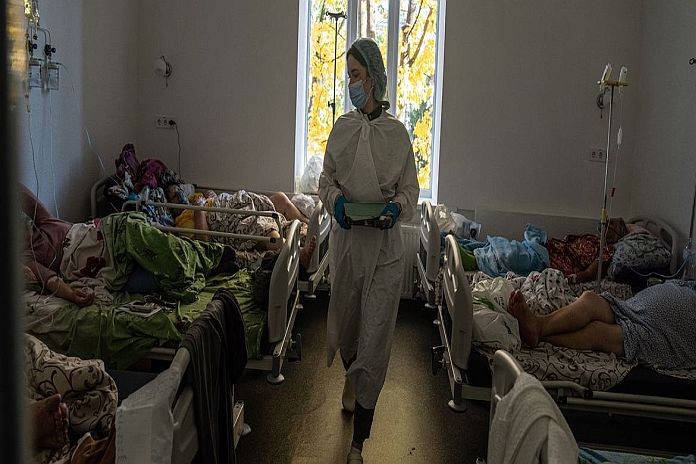GENEVA, Switzerland – With forecasts indicating more than 50 percent of Europeans are likely to become infected with the Omicron variant in the next six to eight weeks, the World Health Organization (WHO) said on Tuesday that health workers still bear the greatest burden.
Currently, the Omicron variant of COVID-19 represents a “new west to east tidal wave sweeping across the region”, said WHO’s Regional Director for Europe, Dr Hans Kluge.
In the first week of January, Europe saw over seven million newly reported cases, more than doubling over a two-week period.
“How each country now responds must be informed by its epidemiological situation, available resources, vaccination uptake status and socioeconomic context”, WHO said.
Omicron highly transmissible
As of January 10, 26 countries reported that over one per cent of their population was being infected each week. According to WHO, Omicron is becoming the dominant variant in western Europe, and is now spreading in the Balkans.
At this rate, the university-based research centre, the Institute for Health Metrics and Evaluation (IHME), forecasts that more than 50 percent of the population in the region will be infected with Omicron within six to eight weeks.
In its situation update, experts from WHO Europe said data collected in recent weeks confirmed that Omicron is highly transmissible: “Because the mutations it has, enable it to adhere to human cells more easily, and it can infect even those who have been previously infected or vaccinated.”
Vaccines still effective
Dr Kluge reiterated that the currently approved vaccines do continue to provide good protection against severe disease and death, including for Omicron.
Furthermore, mortality rates remain stable and continue to be highest in countries with high COVID-19 incidence, combined with lower vaccination uptake.
Dr Kluge highlighted that “because of the unprecedent scale of transmission, we are now seeing rising COVID-19 hospitalizations. It is challenging health systems and service delivery in many countries where Omicron has spread at speed”, threating to overwhelm in many more.
Deeply concerned by the variant moving east, Dr Kluge added that “we have yet to see its full impact in countries where levels of vaccination uptake are lower”.
In Denmark for example, where Omicron cases have exploded in recent weeks, the COVID-19 hospitalization rate for unvaccinated patients was six-fold higher than for those who were fully vaccinated, in the week over Christmas.
Data from the UK Obstetric Surveillance System shows 96 percent of pregnant women admitted to hospital with COVID-19 symptoms between May and October 2021, were unvaccinated, a third of whom required respiratory support.
Burden of response
Reminding that, once again, the greatest burden of responding to the pandemic is being carried by health and care staff, as well as other essential frontline workers, Dr Kluge said that they also carry the highest exposure to the virus, and he called for more support for their mental health and well-being.
In an effort to manage the impact on health services, economies and societies, Dr Kluge had three messages to relay.
Firstly, for countries not yet hit by the Omicron surge, the use of high-quality masks in closed and indoor settings – and ensuring that vulnerable individuals have access to them – is essential.
A full course of vaccines plus booster shots need to be distributed as soon as possible, and finally, he stressed the importance of immediate isolation if symptoms are being experienced.
“This is a precious moment, to prepare response systems, by increasing the supplies of tests and making them widely accessible free of charge at pharmacies, workplaces and in communities, and making them available to critical workers”, he added.
Secondly, where the Omicron surge has begun, “the priority should be to avoid and reduce harm among the vulnerable and minimize disruption to health systems and essential services” by prioritizing vulnerable people for primary course and booster doses, and advising them to avoid closed, crowded spaces, offering the possibility to work remotely wherever possible until the infection surge passes.
Prioritizing PCR testing for individuals who are at risk of developing severe disease, health and other critical workers, and deploying rapid tests more widely, should also be part of the strategy, Dr Kluge continued.
Keep schools open
On his last point, the WHO regional director for Europe, stated that keeping schools open has important benefits for children’s mental, social and educational well-being, and that “schools should be the last places to close and the first to reopen”.
To ensure that, Dr Kluge highlighted the importance of ventilation, hand hygiene and use of appropriate face masks, as well as making vaccines a priority for teachers and staff, and for vulnerable children where it is available.
“Looking ahead, the numbers of infected people are going to be so high in many countries that schools may be unable to keep all classes open all the time, due to a lack of staff. This winter, it is advisable to make arrangements for online learning alongside physical presence, so children can continue with their education when they are unable to attend school in person”, he concluded.





